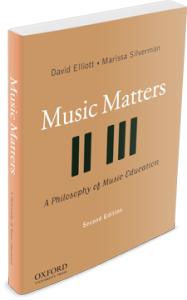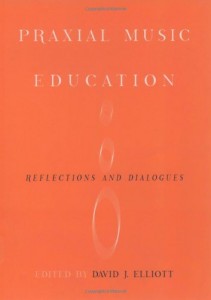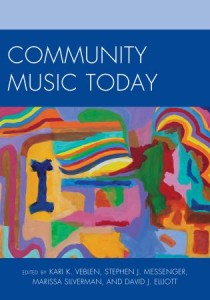Click below to learn more about books by David J. Elliott:
Music Matters, 2nd edition
Why is music significant in life and education? What shall we teach? How? To whom? Where and when? The praxial philosophy espoused in Music Matters: A Philosophy of Music Education offers an integrated sociocultural, artistic, participatory, and ethics-based concept of the natures and values of musics, education, musicing and listening, community music, musical understanding, musical emotions, creativity, and more. Embodied-enactive concepts of action, perception, and personhood weave through the book’s proposals. Practical principles for curriculum and instruction emerge from the authors’ praxial themes.
Learn more about Music Matters, 2nd edition
Music Matters
What is music? Does music deserve a place in general education? If so, why? Music Matters builds new answers to these basic questions through a wide-ranging examination of music as a diverse human practice. The result is a ground-breaking philosophy of music education that provides critically reasoned perspectives on the nature and significance of performing, listening, musicianship, multiculturalism, creativity, consciousness, curriculum development, and more. Indeed, Music Matters is exceptional for the attention it pays to many aspects of music and education that previous music education doctrine either misses or ignores altogether. Following an incisive critique of past thinking, this important text develops a multidimensional concept of music that explains why music making and listening are unique forms of thinking and unique sources of the most important kinds of knowing that human beings can gain. In a richly detailed narrative that examines a wealth of recent philosophical and psychological research, the author constructs a compelling philosophical foundation that allows teachers to affirm to themselves and others that music deserves a central place in the education of all people. Among the many working ideas of this new philosophy is a distinctive concept of “curriculum-as-practicum” that explains how music educators can fulfill their educational mandate.
Learn more about Music Matters
Praxial Music Education
Praxial Music Education is a collection of essays by nineteen internationally recognized scholars in music education. Each essay offers critical reflections on a key topic in contemporary music education. The starting point of each essay, and the unifying thread of this collection, is the “praxial” philosophy of music education explained in Elliott’s Music Matters: A New Philosophy of Music Education (OUP, 1995). This philosophy argues for a socially and artistically grounded concept of music and music education, challenging the field’s traditional “absolutist” foundations. Praxial Music Education is both a critical companion to Music Matters, and an independent text on contemporary issues in music education. Among the themes discussed are multicultural music education, the nature of musical understanding, early childhood music education, the nature and teaching of music listening, music curriculum development, and musical creativity. Praxial music education is a living theory; a dedicated web site offers Elliott’s reflections and “dialogues” with each author’s ideas. This unique collection will not only enrich discussions that already use Music Matters as their core, but will globalize current discussions and applications of the praxial philosophy and emphasize the positive and practical values of collaborative efforts in music education. A companion to Music Matters, this book is designed to spark debate and deeper analysis of this influential theory in music education.
Learn more about Praxial Music Education
Community Music Today
Community Music Today (edited by Kari K. Veblen, Stephen Messenger, Marissa Silverman, & David J. Elliott) highlights community music workers who constantly improvise and reinvent to lead through music and other expressive media. It answers the perennial question “What is community music?” through a broad, international palette of contextual shades, hues, tones, and colors. With over fifty musician/educators participating, the book explores community music in global contexts, interconnections, and marginalized communities, as well as artistry and social justice in performing ensembles.
This book is both a response to and a testimony of what music is and can do, music’s place in people’s lives, and the many ways it unites and marks communities. As documented in case studies, community music workers may be musicians, teachers, researchers, and activists, responding to the particular situations in which they find themselves. Their voices are the threads of the multifaceted tapestry of musical practices at play in formal, informal, nonformal, incidental, and accidental happenings of community music.



